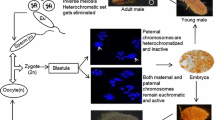Clustering of multiple transgene integrations in highly-unstable Ascobolus immersus transformants (original) (raw)
Abstract
A large proportion of Ascobolus immersus transformants are highly unstable in crosses: the phenotype conferred by the transgene is not transmitted to the progeny, irrespective of the endogenous or foreign origin of the transgene. They all have integrated multiple transgene copies, clustered at a single chromosomal site or at tightly-linked sites. Clustered non-homologous integrations are always rearranged. Yet they never escape the “methylation induced premeiotically” (MIP) process. This always results in gene silencing, even when the transgene is partially repeated, accounting for the high instability of these transformants.
Access this article
Subscribe and save
- Get 10 units per month
- Download Article/Chapter or eBook
- 1 Unit = 1 Article or 1 Chapter
- Cancel anytime Subscribe now
Buy Now
Price excludes VAT (USA)
Tax calculation will be finalised during checkout.
Instant access to the full article PDF.
Similar content being viewed by others


In praise of mealybugs
Article 30 April 2018
Explore related subjects
Discover the latest articles and news from researchers in related subjects, suggested using machine learning.
References
- Asch DK, Frederick G, Kinsey JA, Perkins DD (1992) Analysis of junction sequences resulting from integration at nonhomologous loci in Neurospora crassa. Genetics 130:737–748
Google Scholar - Barry C, Faugeron G, Rossignol J-L (1993) Methylation induced premeiotically in Ascobolus: coextension with DNA repeat lengths and effect on transcript elongation. Proc Natl Acad Sci USA 90:4557–4561
Google Scholar - Bennett JW, Lasure LL (1991) Growth media. In: Bennett JW, Lasure LL (eds) More gene manipulation in fungi. Academic Press, San Diego, pp 441–458
Google Scholar - Bull JH, Wootton JC (1984) Heavily-methylated amplified DNA in transformants of Neurospora crassa. Nature 310:701–704
Google Scholar - Faugeron G, Goyon C, Grégoire A (1989) Stable allele replacement and unstable non-homologous integration events during trans-formation of Ascobolus immersus. Gene 76:109–119
Google Scholar - Faugeron G, Rhounim L, Rossignol J-L (1990) How does the cell count the number of ectopic copies of a gene in the premeiotic inactivation process acting in Ascobolus immersus?. Genetics 124:585–591
Google Scholar - Fincham JRS (1989) Transformation in fungi. Microbiol Rev 53:148–170
Google Scholar - Goyon C, Faugeron G (1989) Targeted transformation of Ascobolus immersus and de-novo methylation of the resulting duplicated DNA sequences. Mol Cell Biol 9:2818–2827
Google Scholar - Goyon C, Faugeron G, Rossignol J-L (1988) Molecular cloning and characterization of the met2 gene from Ascobolus immersus. Gene 63:297–308
Google Scholar - Hynes MJ, Corrick CM, King JA (1983) Isolation of genomic clones containing the amdS gene of Aspergillus nidulans. Mol Cell Biol 3:1430–1439
Google Scholar - Jones PA, Taylor SM (1980) Cellular differentiation, cytidine analogs and DNA methylation. Cell 20:85–93
Google Scholar - Nelson M, McClelland M (1991) Site-specific methylation: effect on DNA modification methyltransferases and restriction endonucleases. Nucleic Acids Res 19:2045–2071
Google Scholar - Pandit NN, Russo VEA (1992) Reversible inactivation in a foreign gene, hph during the asexual cycle in Neurospora crassa transformants. Mol Gen Genet 234:412–422
Google Scholar - Perkins DD, Kinsey JA, Asch DK, Frederick GD (1993) Chromosome rearrangements recovered following transformation of Neurospora crassa. Genetics 134:729–736
Google Scholar - Punt PJ, Oliver RP, Dingemanse MA, Pouwels PH, van den Hondel CAMJJ (1987) Transformation of Aspergillus based on the hygromycin B resistance marker from Escherichia coli. Gene 56:117–124
Google Scholar - Razanamparany V, Bégueret J (1988) Non-homologous integration of transforming vectors in the fungus Podospora anserina: sequences of junctions at the integration sites. Gene 74:399–409
Google Scholar - Rhounim L, Rossignol J-L, Faugeron G (1992) Epimutation of repeated genes in Ascobolus immersus. EMBO J 11:4451–4457
Google Scholar - Rizet G, Engelman N, Lefort C, Lissouba P, Mousseau J (1960) Sur un Ascomycète intéressant pour l'étude de certains aspects du problème de la structure du gène. C R Acad Sci Paris, 250:2050–2052
Google Scholar - Rizet G, Rossignol J-L, Lefort C (1969) Sur la variété et la spécificité des spectres d'anomalies de ségrégation chez Ascobolus immersus. C R Acad Sci Paris 269:1427–1430
Google Scholar - Romano N, Macino G (1992) Quelling: transient inactivation of gene expression in Neurospora crassa by transformation with homologous sequences. Mol Microbiol 6:3343–3353
Google Scholar - Rossignol J-L, Faugeron G (1994) Gene inactivation triggered by recognition between DNA repeats. Experientia 50:307–317
Google Scholar - Selker EU (1990) Premeiotic instability of repeated sequences in Neurospora crassa. Annu Rev Genet 24:579–613
Google Scholar - Wernars K, Goosen T, Wennekes BMJ, Visser J, Bos CJ, van den Broek HWJ, van Gorcom RFM, van den Hondel CAMJJ, Pouwels PH (1985) Gene amplification in Aspergillus nidulans by transformation with vectors containing the amdS gene. Curr Genet 9:361–368
Google Scholar
Author information
Authors and Affiliations
- Institut de Génétique et Microbiologie, CNRS URA 1354, Université Paris-Sud, Bâtiment 400, F-91405, Orsay cedex, France
Laïla Rhounim, Annie Grégoire, Salah Salama & Godeleine Faugeron
Authors
- Laïla Rhounim
- Annie Grégoire
- Salah Salama
- Godeleine Faugeron
Additional information
Communicated by O. C. Yoder
Rights and permissions
About this article
Cite this article
Rhounim, L., Grégoire, A., Salama, S. et al. Clustering of multiple transgene integrations in highly-unstable Ascobolus immersus transformants.Curr Genet 26, 344–351 (1994). https://doi.org/10.1007/BF00310499
- Received: 21 December 1993
- Accepted: 28 February 1994
- Issue Date: October 1994
- DOI: https://doi.org/10.1007/BF00310499
